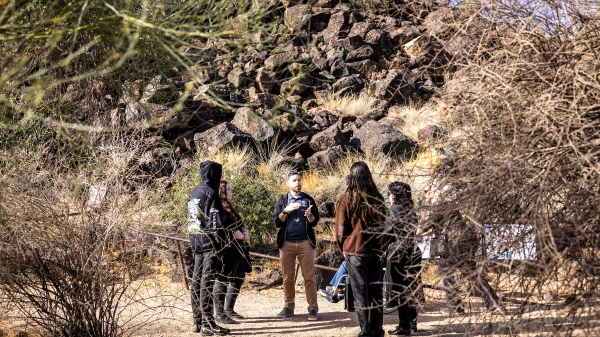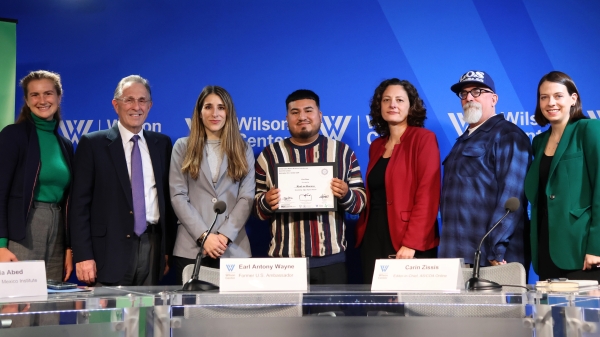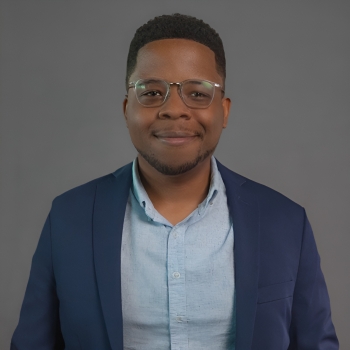How AI is helping tailor the student experience at ASU

AI-generated image by Alex Davis/ASU
Editor's note: This expert Q&A is part of our “AI is everywhere ... now what?” special project exploring the potential (and potential pitfalls) of artificial intelligence in our lives. Explore more topics and takes on the project page.
Every year, university students are faced with the task of choosing a major. For many, it can create a choice paralysis that prevents them from moving forward.
At EdPlus at ASU, Director of Creative and Emerging Technology Auryan Ratliff and his team are designing an AI tool that aims to help alleviate this decision with personalized degree recommendations.
Ratliff first joined EdPlus at ASU in 2015 and has since directed several teams focused on designing innovative digital tools for students through VR/AR, AI and other emerging technologies.
He founded SPLIT Studio, an XR game development studio within EdPlus that creates immersive experiences for ASU Online, Dreamscape Learn and ASU partners — pushing the boundaries of immersive technology in education. He also leads a new product team at EdPlus, collaborating with other groups at the university to build strategies around AI adoption and developing novel AI experiences that enhance the student journey.
The degree recommendation engine is one of the newest examples of AI tools that are under development from his team. Designed to empower students at any point in their educational journey, the engine will be a resource to streamline the process of choosing from over 800 ASU degrees. Based on the user’s response to a series of questions, it will generate a personalized list of degree programs and a short explanation for each that explains to the student why this offering would be a good fit for them.
But how can a creative team design such a tool when technology evolves so rapidly? Here, Ratliff talks about his expertise on AI and personalized user experiences.
Note: Answers have been edited for length and/or clarity.
Question: Tell us about your experience joining ASU. How did EdPlus SPLIT Studio and your AI team come to be?
Answer: I joined Arizona State University nearly a decade ago, starting as a student worker in graphic design in 2015. From the beginning, ASU was a place that embraced innovation and creativity, and I quickly found myself enamored with the culture and dynamic environment. My journey at ASU evolved through various roles in UX design, design operations and immersive product design, each step fueled by a passion and curiosity for new technologies.
SPLIT Studio was born out of this innovative spirit and my enthusiasm for immersive technologies like VR and AR. What began as informal VR demonstrations around the office grew into a dedicated effort to explore and design XR experiences for ASU Online students and our partners. Recognizing the potential of these technologies, the leadership at EdPlus decided to establish SPLIT Studio — Student Powered Lab for Immersive Technology — where students and full-time employees collaborate to create immersive educational experiences.
When generative AI and tools like ChatGPT first became publicly available, we were immediately intrigued by their potential. Leveraging our team's expertise in machine learning and artificial intelligence, we built several AI proof of concepts within SPLIT Studio. These projects were well received, leading to increased demand for AI-driven solutions. As AI grew in importance at the university, EdPlus recognized the need to embrace this technology more fully. Our success with AI projects within SPLIT Studios laid the groundwork for forming a dedicated AI team, solidifying our role in driving AI innovation at ASU.
Q: How do you approach AI in your work? How do you consider it and other rapidly developing technology to “future-proof” strategies?
A: In my work, I approach AI with a mindset focused on both innovation and practicality. It's essential to not only explore the cutting-edge possibilities of AI but also to ensure that the technology we develop is scalable, ethical and aligns with the overall mission at ASU. To future-proof our strategies, we embrace the concept that change must be a fundamental part of our planning.
The only way to future-proof a strategy is to factor in change from the outset. This technology is evolving so rapidly that if you aren't anticipating what could come next or how to quickly adapt what you have, you'll quickly fall behind the curve. At the same time, it’s essential to balance this need for speed with the time required to build quality solutions. Often, by the time you ship a product, the underlying technology may already be outdated.
To address this, we stay updated with the latest advancements by attending conferences, participating in workshops and engaging with the broader tech community. We work closely with various AI groups across the university to develop a cohesive and forward-thinking approach to AI integration. Additionally, our AI solutions are designed to be scalable and adaptable, allowing us to quickly respond to new developments and integrate them into our existing frameworks without significant overhauls. By combining continuous learning, collaborative development and scalability, we create AI-driven strategies that are robust and capable of adapting to the rapid pace of technological change.
Q: Can you discuss the degree recommendation engine and how AI was considered in its development?
A: The idea for the degree recommendation engine has been on our minds for quite some time. We noticed that students visiting our website often browse through our extensive list of degree programs without applying any filters, simply going through them in alphabetical order. This approach led to many students feeling overwhelmed, often not making it past the early part of the list. We recognized that these students were eager to learn more about their college options but were hindered by the sheer volume of information.
The advent of generative AI presented us with a powerful tool to address this challenge. We realized that AI could help us condense and personalize the information, highlighting the most relevant pieces for each student. With generative AI, we could go beyond basic filters and start asking more nuanced questions such as: "Do you want to make social change?" "Do you want to work with your hands?" "Do you want to travel for work?" These are elements we typically do not have direct data points for within our degree programs.
Generative AI's semantic understanding allows us to map these broader life goals and preferences to our degrees without the need for extensive manual data tagging. This approach is crucial because students often have a clear vision of the type of life they want to lead and the kind of work they aspire to do, but they may not know which degree will get them there or the exact name of the career that fits their criteria.
Each recommended degree comes with a tailored explanation that refers back to the student's initial inputs, providing a clear rationale for why the degree is a good fit. This explanation covers potential career paths, relevant courses and key learning outcomes, all framed in a way that resonates with the student's interests.
Q: Regarding student experiences, how do you see tech being utilized for personalized education?
A: The possibilities for using AI in personalized education are truly limitless. Imagine personalized tutors who can accompany students throughout all their courses, making connections to lessons given in other classes or referencing concepts and experiences from the student's own life. AI can also enable students to interact with historical figures through advanced simulations, bringing history to life in engaging and interactive ways. This is especially true for our online students; AI can transform traditional lectures into dynamic, interactive experiences.
This transformation will be particularly powerful because every student's journey is unique, with individual starting points, goals and challenges. The introduction of generative AI has made it possible to embrace these unique aspects, tailoring lessons to students' needs, improving learning outcomes and making higher education more accessible.
With AI, we can provide real-time feedback, customize learning paths and offer resources that cater to individual strengths and weaknesses.
Q: How would you approach AI parameters where it relates to data and personalization?
A: It’s crucial to focus on transparency, security and user feedback to ensure success. Transparency involves clearly communicating how data is collected and used, and how AI-driven decisions are made, which helps build trust with users. We ensure users understand the purpose and benefits of data usage in our AI systems.
Security is paramount to protecting personal data. We are committed to doing everything in our power to ensure all tools we leverage are thoroughly reviewed and approved for sensitive student data. This includes regular checks to ensure that none of this information is accessible to third parties. By prioritizing rigorous security measures, we safeguard user privacy and maintain the integrity of our AI systems.
Q: What can other universities learn about how you’ve leveraged AI, and how can others embrace AI to better serve their audience?
A: In terms of embracing AI, if you haven’t done any work in that area, my biggest piece of advice is to just start experimenting. Begin by identifying specific challenges within your university and explore how AI can address them. This ensures that your AI initiatives are driven by real needs.
Whether you have in-house developers or not, there are many ways to get started. Developers can research and experiment with the latest AI APIs, while low-code and no-code solutions make it accessible for everyone at the university to experiment with AI. Even tools like ChatGPT, Gemini or other generative AI platforms can provide valuable insights into the technology and how it can be leveraged at your university.
Once your experimentation leads you to a project or process that you want to pursue, you’ll want to make sure you continually seek feedback and refine your AI solution. This iterative process helps ensure that the technology remains relevant and effective. By focusing on real-world problems and being open to learning and adaptation, universities can develop AI-driven solutions that truly enhance the educational experience and better serve their communities.
Q: If you had any advice for students looking to learn more about AI and creative design, what would you tell them?
A: My biggest advice is to dive right in and start experimenting with AI. The potential of generative AI in creative design is vast, and to truly grasp its capabilities, you need to engage with the technology hands-on. Understanding AI is key to integrating it into your creative process effectively.
AI can be a powerful tool to enhance your creativity, allowing you to transcend your current limitations. By automating tedious tasks, AI frees you up to focus on your grand creative vision. It offers new ways to approach your work, enabling you to create more dynamic and ambitious projects than ever before.
However, while AI can greatly augment your creativity, it’s essential to use it ethically and responsibly. Done right, AI doesn’t replace the artist but rather empowers them, opening up new possibilities for innovation. Embrace the technology, explore its potential and let it transform your creative process.
AI is everywhere ... now what?
Artificial intelligence isn't just handy for creating images like the above — it has implications in an increasingly broad range of fields, from health to education to saving the planet.
Explore the ways in which ASU professors are thinking about and using AI in their research on our special project page.
More Arts, humanities and education

Petroglyph preserve celebrates 30th anniversary with ancient, modern tales
The Deer Valley Petroglyph Preserve provides a beautiful walk through a pristine desert where chuckwalla lizards are as plentiful as the cacti that comes in many shapes and sizes.It’s also a step…

Kaleidoscope short film contest inspires powerful binational filmmaking in its second year
“We come to this country not to steal anybody’s jobs but to take advantage of the opportunities that the rest ignore. We’ve been taking care of the American soil for many years. But our hands will…

ASU's Neal Lester reflects on life, death of poet Nikki Giovanni
When Neal Lester heard on Monday that poet and activist Nikki Giovanni had died, the news hit hard.Lester, the founding director of Arizona State University’s Project Humanities and a Foundation…

